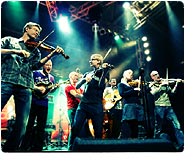|
|
 |
 The Smiling North:
The Smiling North:
Frigg’s Expert Playfulness and Nordic Exuberance Return to North America, September and October 2011
Dour Scandinavians? Don’t make the Finnish and Norwegian folk virtuosi of Frigg giggle.
“The overall picture people have of Scandinavians has very little to do with the music,” Antti Järvelä, fiddler and Frigg founder explains. “People think Finnish music in particular is melancholy and minor. But if you look at tunes from before World War II, seventy percent are in a major key. They are happy.”
This neglected joy—the good times of Nordic parties, dances, and weddings— inspired the seven-member group with deep folk roots to breathe fresh life into their ancestors’ wild and merry tunes. The result: the string-bending, tongue-in-cheek genre of “Nordgrass.”
On Grannen (self released: September 13, 2011) and on stages from Malmö to Malaysia, Frigg bursts with an energy and freewheeling fun that belies their intense musical training. Veteran international performers with decades of touring under their belts, Frigg return to North America this autumn for an extensive tour that will spread the sheer pleasure of Northern tunes across the Upper Midwest and several major festivals (Chicago, Albuquerque, Bloomington, IN).
“Frigg is on the new edge,” Järvelä smiles. “And we are making very happy music.”
~~~
Though they now play more abroad than they do at home, Järvelä and several fellow Frigg players have deep roots in Nordic tradition. They hail from one of Scandinavia’s roots-music hotspots, Kaustinen, a small Finnish town of 5,000 which boasts literally hundreds of fiddle players. After decades in training at folk music sessions, guided by exacting relatives and musical elders, Järvelä and company felt it was time explode tradition wide open. And they have a blast doing it.
“In the old days, we did things very particularly,” reflects Järvelä, who’s played with fellow Frigg fiddler Esko Järvelä since the two were barely out of kindergarten. “We really learned lots of details and were required to stay in the form of our teachings. Basically, when you smiled then, it meant you had made a mistake. Now when we smile, it has nothing to do with mistakes.”
Frigg departs from those hard-learned bounds, absorbing the rollicking reels, rippling triplets, and lonesome loveliness of the British Isles and American bluegrass—and makes them sing. “Maple Cake Farm” recalls a glorious day the group spent as guests in New England, as the mandolin suggests the rolling contours of American folk melodies. Party tunes like “Rajrajraj” (a Norwegian exclamation of good times) would be equally at home at an Appalachian front-porch jam or a good old-fashioned Irish céilí.
Yet the band is at its brightest when bringing innovation to the traditions of Scandinavia. The reserved grace of the Norwegian traditional tune “Grannen” or the upbeat savor of “Potatisvals,” composed by Swedish folk icon and musical mentor Ale Möller, open up into sliding solos, merrily brandished bows, and experimental wavelengths. “Amurin tiikeri,” part of an unexpected collaboration Frigg undertook with Norway’s top military marching band, ropes in drums and horns, taking tradition into anthem territory.
Though steeped in tradition and highly trained, Frigg’s vibe remains strikingly spontaneous and democratic, on stage and off. Members shift, changing the energy of the group, and everyone brings in old gems or new ideas to try out.
“Someone will remember a good tune or come up with a good idea,” Järvelä explains, reflecting on the band’s creative process. “We try it out then and there, and if we feel there’s potential we leave it for a while, then come back to it. We build an arrangement up from the feeling we have in that moment.”
This easy-going, happy-go-lucky feel leads to moments of barely controlled chaos live, but Järvelä loves every minute. “There are some tunes that are hard to play on stage, old rocking waltzes and such. We go over the edge. We even lose track of where we are in the music,” Järvelä recounts. “But so long as someone keeps the tune going, it doesn’t matter. Different characters emerge from behind the instruments. And the audience goes crazy.”
<< release: 09/13/11 >>
|
|
 |
|
|
|